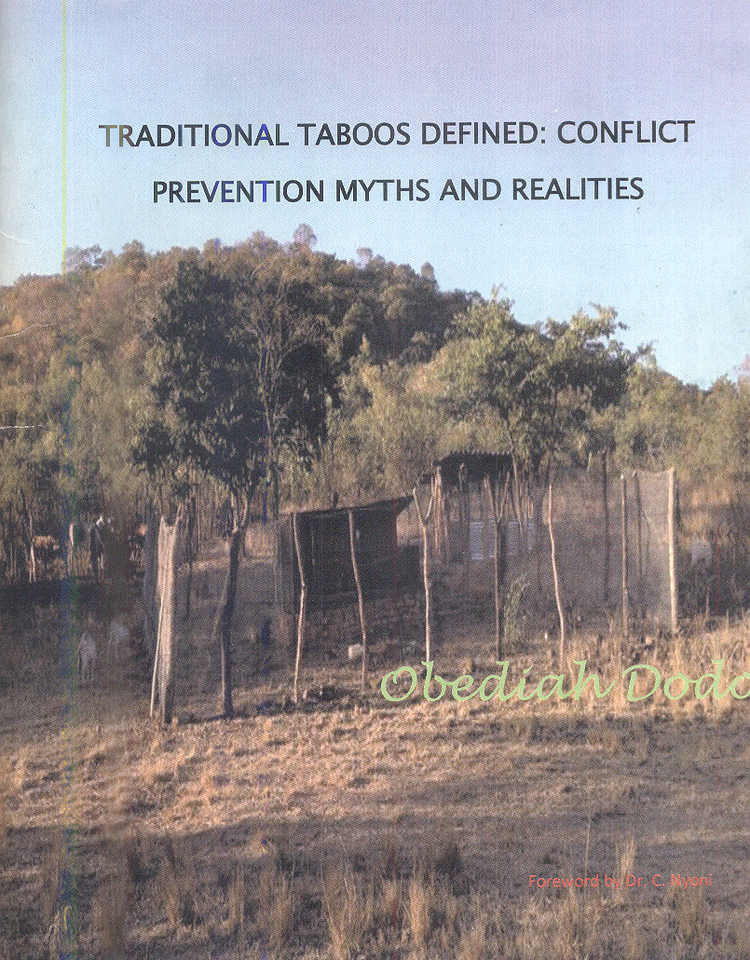
The Sunday Mail

 Traditionally, it is believed in various native cultures that if one transgresses socially or goes against set societal systems and expectations, there are some varied calamities that are experienced by either the individual or the entire community.
Traditionally, it is believed in various native cultures that if one transgresses socially or goes against set societal systems and expectations, there are some varied calamities that are experienced by either the individual or the entire community.
These systems and expectations, called taboos, have been present for many centuries, with most of them implemented to regulate social behaviour.
Some of these taboos have stood the test of time and are still being observed with caution while several have lost their relevance due to various factors.
On the academic front, there has been limited effort in publishing issues with regards to taboos among other traditional practices, moreover in English, the major language used in various curricular.
However, Obediah Dodo, a Peace and Governance lecturer has published a book “Traditional Taboos Defined: Conflict Prevention Myths and Realities”, in which he explores taboos and belief systems that have been a part of African culture and the roles which they play in regulating societal behaviour.
This book tries to dig deep into the history of taboos, the myths, present realities and significance among other subjects.
Although Dodo expended some of his energy to giving a solid background as well as presenting arguments from various scholars on the subject, the greater part of the book was dedicated to explaining numerous taboos which he put into different categories.
The book gives a clear picture of how human behaviour has been shaped as a result of these belief systems and how society has benefited.
Taboos are said to be enforced by social cohesion and practice, whereby society believes that any violator of the norms will suffer or face misfortune.
However, they are not cast in stone and can be changed, wiped off or have others devised and added on, depending on the prevailing circumstances, challenges, geographical location, culture and people’s perceptions towards their resources and heritage.
“It must, however, be realised that in many African societies, Zimbabwe included, esteemed taboos are now on the periphery and rapidly phasing out mainly due to socio-economic challenges and the wave of modernisation that has flown across borders,” explained Dodo.
As I read on, I started grasping some of the reasons why most youths have very little understanding of our taboos and one of these is the Westernised education system which does not emphasise their importance.
Making use of various scholars, Dodo highlights that taboos were regarded as part of traditional education systems, whereby societies were expected to socialise youths into their customs, religious philosophy, ethical values and societal views of the entire community.
It cannot be disputed that most of these guidelines have managed to whip society into line by instilling fear in individuals, thereby restraining them to exist within set rules.
However, there is limited evidence proving their authenticity, showing that some of these things were just made up.
“Interestingly, most of the scholars around the concept of taboos acknowledge that while taboos have over the years managed to control societies, there is an element of falsehood,” elaborated Dodo.
The book goes on to explain some of the roles which taboos play and how they are applied in society.
Some of the roles mentioned included maintaining and nurturing peace, harmony and development as well as regulation of ethical use of the environment among other things.
Following the footsteps of many scholars who have dealt with this subject, Dodo also put the various taboos into categories which included morals, health, religion, conservation and death to mention a few.
One of the taboos explored was the issue of “ngozi”, which says that if you kill another person, avenging spirits will torment you.
“While this was designed to stop people from killing each other, it also sought to promote peace in communities.
“It argued that if one killed another, the spirits of the dead were likely to rise up and fight back against the murderer.”
Although he did not cover each and every taboo that we might know, his effort produced an eye-opener that seeks to educate people about the relevance of taboos in our society.
By using numerous references, he managed to bring out the motives behind the taboo system, avenues from which it has been passed from one generation to the next and also the effects to society as a whole.
Presently pursuing a doctoral degree in Endogenous Conflict Resolution, he has published over 30 refereed papers and book chapters with internationally-renowned journals and authored over 20 study modules for different universities.



